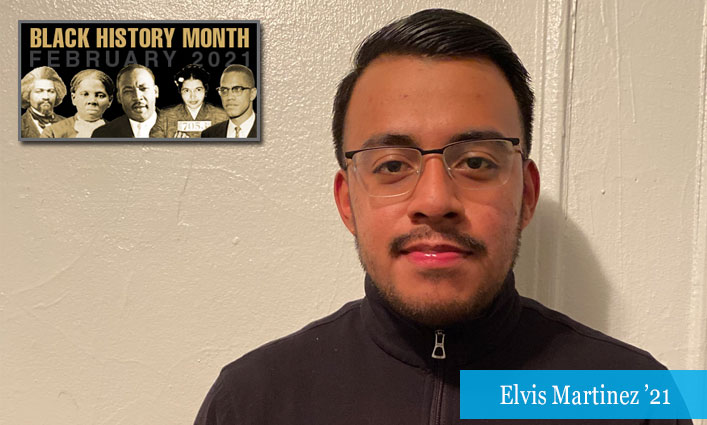
John Jay’s celebration of Black History Month traditionally culminates with our annual Malcolm/King Awards Breakfast, which pays homage to the two Civil Rights giants, Malcolm X and Dr. Martin Luther King, Jr., while also recognizing the incredible talents of our student award winners and present racial justice visionaries. While this year’s celebration may be a little different, the vigor in how we honor their legacy remains the same. In anticipation of this year’s virtual Malcolm/King Awards Breakfast on February 26, 2021, we spoke with the student award winners to understand what Black History Month means to them and to learn how they hope to advance the goals of justice and equality for all.
Elvis Martinez ’21, a Criminal Justice major from Brooklyn, New York, believes in the transformative power of community and sees how a small group of people working together can uplift an entire generation. Drawing inspiration from the work of the Black Panther Party’s community social programs, his goal is to work in the nation’s most underserved communities, providing them with equitable access to education, medical care, job opportunities, and resources to help system-impacted families break the cycle.
February is Black History Month. What does it mean to you to celebrate the many achievements generations of African-Americans have accomplished?
As a first-generation Mexican-American college student, I am so honored to be able to celebrate Black History Month. I am a strong believer that Black History Month should be recognized, and that Black history should be taught in classrooms year-round. African-Americans have made so many contributions to our society, helping to shape the United States, and what they’ve given to this country should be acknowledged and celebrated.
“I want to help eliminate prisons and instead provide young people, families, and entire communities with resources to help them thrive.” —Elvis Martinez
What goals do you have for advancing equality and fairness for all people—especially African-Americans?
I would advance equality for all by helping families who have been impacted by the War on Drugs. I want to help eliminate prisons and instead provide young people, families, and entire communities with resources to help them thrive. What we need is access to rehabilitative resources, which can help prevent future generations from entering into and being impacted by the system.
When you think of African-American history, what makes you the proudest?
The movement that stands out to me is the Black Panther Party and their mission to provide social services to African-American communities. They created the Free Breakfast for School Children Program that provided free meals to thousands of kids, ensuring students were fed before the start of the school day. This helped the kids be more attentive in the classroom and they performed better. Learning about the Black Panthers’ breakfast program and its impact on the community was an eye-opening moment for me. I realized how life changing working in your community can be. When people come together, so much can be done to help and uplift every person in the community.
“Learning about the Black Panthers’ breakfast program and its impact on the community was an eye-opening moment for me. I realized how life changing working in your community can be.” —Elvis Martinez
If you could talk to Malcolm X or Dr. Martin Luther King, Jr., what would you ask them? What would you want to say to them?
I would tell them both that I appreciate how hard they fought for the rights of not only African-Americans but all Americans—they really paved the way for us all. If I could ask a question, I would ask Malcolm X about the books he read and how they shaped his thoughts about the power structure in the United States.
The last 12 months have been challenging, with a global pandemic that has disproportionately affected our Black and brown communities, and a national reckoning on systemic racism. What steps can we take to move forward as a society and a country to make equality for all achievable?
The Covid-19 pandemic has taken the lives of so many people in our country, especially people in Black and brown communities. I believe that the systematic racism, implicit bias, and racial disparities in the health care system led to unequal treatment of Black and brown people in hospitals, there were inequities in treatment. Moving forward, we should create premium health care access for all—for the homeless, for the undocumented, for the people in prisons, for everyone. Health care should be a fundamental human right in this country. All people should have access to good, equitable health care and treatment.
“Health care should be a fundamental human right in this country. All people should have access to good, equitable health care and treatment.” —Elvis Martinez
What does being named a winner of the Malcolm/King Scholarship mean to you?
Being named the winner of the Malcolm/King scholarship award is an honor, I find myself feeling truly fortunate. The scholarship will support me in completing my education and earning my bachelor’s degree. Malcolm X and Dr. Martin Luther King, Jr. are two human beings that I have admired all my life, and I’ve made it my goal to learn more about them and the significant impact they’ve had on their communities. Like Malcolm X and Dr. King, I aspire to be of service, especially to our Black and brown communities.
If everything goes according to plan, where do you see yourself in 10 years?
I see myself earning my doctorate. My mission is to advocate for groups of people who have been marginalized and forgotten in our communities, and I will work to provide them with equal access to resources. As a country, we should not build borders, prisons, or separate children from their parents. What we should be doing is building bridges, helping our communities, uplifting others, and transforming society for the better.



